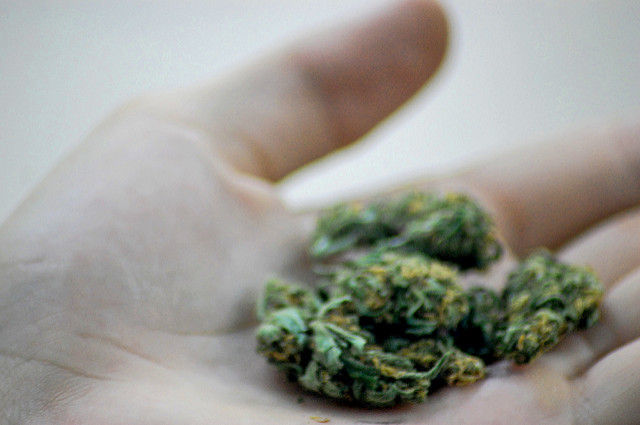Emery Cowan

Katherine Hitt, flickr
When
it comes to marijuana use and breastfeeding, Flagstaff Medical Center
and other local providers of breastfeeding services have clear policies:
if a mother is using marijuana, her newborn baby shouldn’t be drinking
her milk.
If a mother or her
baby test positive for marijuana, FMC declines to provide mothers with
breastfeeding instructions and supplies and requires the physician to
order formula instead of breastfeeding.
At
the Flagstaff Birth and Women’s Center, lactation consultant Maya
Radoccia-Kennen said she will never refuse lactation services but
definitely discourages marijuana use and breastfeeding. La Leche League
volunteer leaders also advise against marijuana use during
breastfeeding.
But
one of the best-known experts on drugs and medications in mothers’ milk
says his new research suggests a more flexible policy might be better
for the health of newborn babies.
The
small study of mothers who smoked marijuana found that breastfeeding
infants ingested an estimated 2.5 percent of the maternal dose of THC,
the active chemical in marijuana.
The study, published this month in Obstetrics and Gynecology,
also found that the levels of THC in the mother’s milk decline with
time, so if a mother smoked marijuana then waited three to four hours
there would be “virtually none” in her milk, said study co-author Thomas
Hale, a professor of pediatrics at Texas Tech University School of
Medicine and co-director of the InfantRisk Center.
Hale also co-authored the popular reference book “Medications and Mother’s Milk.”
Hale also co-authored the popular reference book “Medications and Mother’s Milk.”
With
the legalization of marijuana on the rise and hospitals creating or
revising policies to address it, Hale cautioned against hardline
policies about marijuana use and breastfeeding. Instead, hospitals
should assess mothers individually and more carefully evaluate the
potential harm of marijuana use versus the risks associated with not
breastfeeding, which are major and well-known, he said.
Those
risks include a higher likelihood of the infant dying from infectious
disease, having a lower IQ, developing diabetes and getting diagnosed
with a cardiac disease, Hale said. It also increases the risk of breast
cancer in mothers, he said.
“Just
to say because the (marijuana) drug screen is positive that a mother
can't breastfeed just is not analyzing the situation,” Hale said. “That
means what you're doing is banning the baby from getting breastmilk and
increasing the risk of infectious disease and other harmful effects."
In
short, according to his research, the risk to the baby of not
breastfeeding is high while the risk of the mother being an occasional
marijuana user is low, Hale said.
“We’re trying to interject some reality in this and get rid of the hysteria associated with it,” he said.
Hale stressed that a heavy user,
meaning a mother who uses marijuana every day, should not breastfeed her
baby. And despite what he said are low risks, Hale also said he would
advise a mother who does use marijuana, even occasionally, to
discontinue that practice. Mothers absolutely should not breastfeed at
the same time they are smoking marijuana, he said.
The
study also noted that it remains unclear what exposure to cannabis
products does to an infant’s brain during such a critical development
period.
HOSPITALS WEIGH IN
Northern
Arizona Healthcare, the parent organization of Flagstaff Medical
Center, does stress that “breast is best” for both mom and baby,
spokeswoman Sophia Papa wrote in an email.
The
hospital generally supports breastfeeding if a mother has a history of
marijuana use but is currently not using and the urine toxicology for
mom and baby are negative, Papa wrote.
Banner
Health, which has hospitals in six states including Arizona, has a
policy similar to FMC though there’s a possibility things could change
as more people use marijuana and further research comes out about the
effects of the drug during and after pregnancy, said Barbara Edwards,
director of the women and infant services unit at Banner Desert Medical
Center and Cardon Children’s Medical Center in the Phoenix area.
In
looking at creating policies based on a study like Hale’s, however,
it’s important to note that his involved a controlled amount of THC
while in real life the amount of the chemical compound in a mother’s
breastmilk is highly dependent on how much and how frequently she uses
marijuana, said Kristi Kramer, a lactation consultant with the hospital.
Some of the country’s largest medical organizations caution against the practice as well.
The
Centers for Disease Control and Prevention, the American College of
Obstetricians and Gynecologists and the American Academy of Pediatrics
all discourage breastfeeding while mothers are using marijuana. Studies
have found that exposure to THC through breast milk is associated with
decreased motor development in babies, and a March, 2018 paper in The Journal of Pediatrics found prenatal cannabis use was associated with a 50 percent increased likelihood of low birth weight.
Hale’s own study also recognizes the need for much more research.
“Larger-scale
investigations are warranted and necessary to enable us to counsel
women who may be using cannabis medicinally or recreationally,” the
authors state.

No comments:
Post a Comment